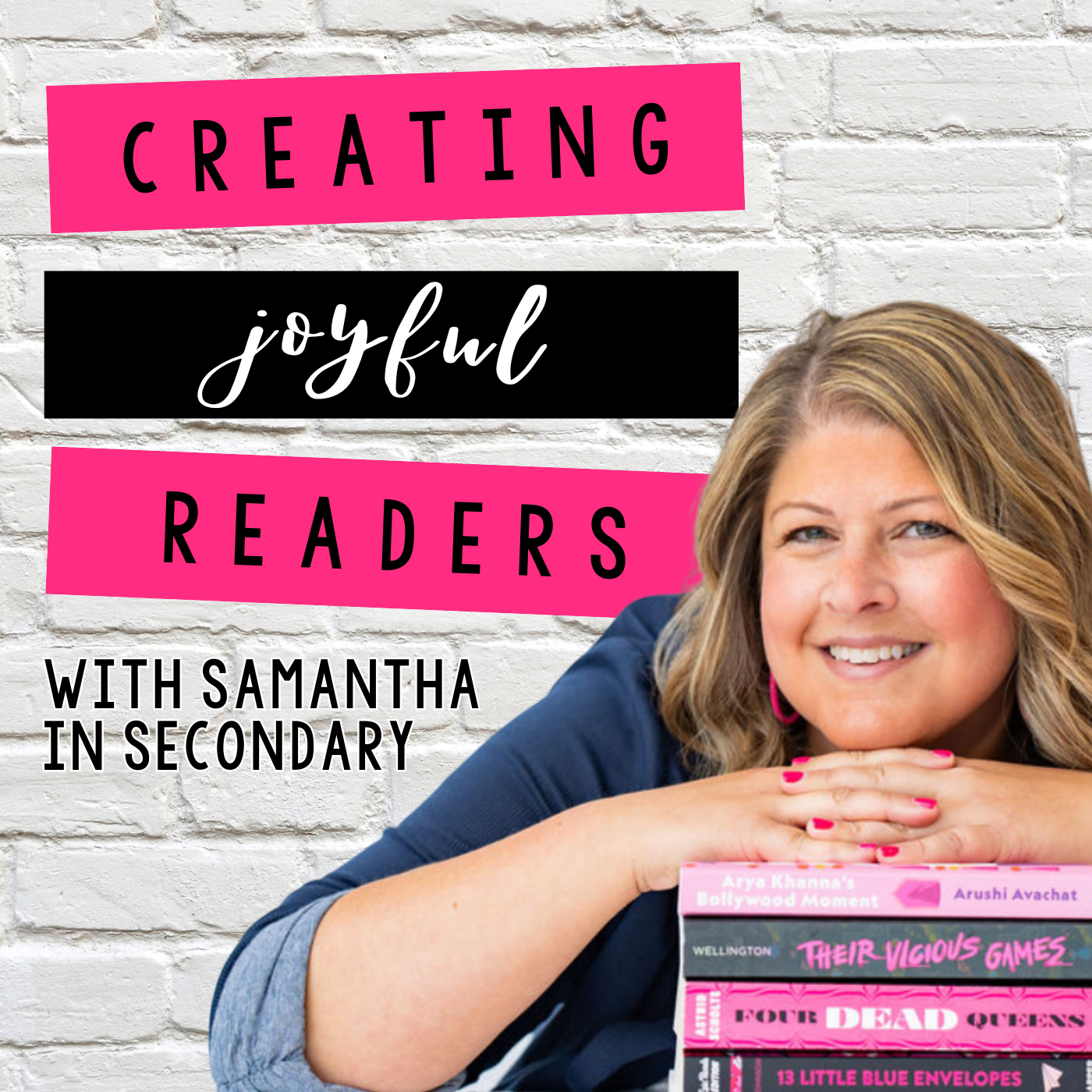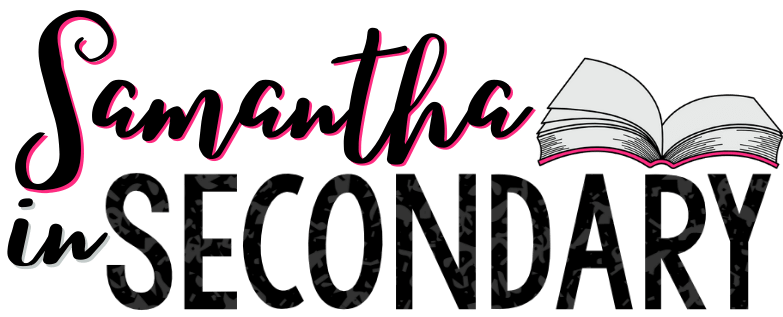[00:00:00] Samantha: What if time travel were possible? What if magic and science collided? What if we lived in a world where artificial intelligence developed emotions or where humanity had to fight for survival in a distant galaxy? These what if questions are the foundation of speculative fiction, a genre that invites readers to imagine worlds beyond their own.
[00:01:03] Speculative fiction is an umbrella term that includes science fiction, fantasy, dystopian fiction, and even supernatural horror. It challenges reality, bending the rules of our world and creating entirely new ones. But more than just escapism, speculative fiction offers deep social commentary, explores ethical dilemmas, and helps readers develop critical thinking skills.
[00:01:25] In today’s episode, we’re diving into the world of speculative fiction. We’ll break down what it is, explore why it captivates teen readers, take a quick look at its history, and uncover its very many sub genres. And of course, we’ll talk about some of the best books to bring into your classroom. Whether your students are drawn to futuristic technology, magical realms, or eerie alternate realities, speculative fiction has something for everyone.
[00:01:50] So let’s jump in and discover how this genre sparks curiosity, creativity, and a lifelong love of reading.
[00:01:56] Speculative fiction is a genre that asks, what if? What if the world were different in ways that defy reality as we know it? It’s an umbrella term that includes science fiction, fantasy, dystopia, and supernatural horror, all of which bend the rules of our world or create entirely new ones. At its core, speculative fiction explores possibilities, whether through advanced technology, magical systems, alternate histories, or eerie unexplained phenomena.
[00:02:23] In young adult literature, some standout examples include Scythe by Neal Shusterman, which imagines a future where humans have conquered death, Children of Blood and Bone, a rich fantasy inspired by West African Mythology, and Warcross, a cyber thriller that blends gaming and virtual reality.
[00:02:41] No matter the subgenre, speculative fiction allows readers to escape into the unknown while reflecting on real world issues in new and thought provoking ways.
[00:02:49] Speculative fiction has a unique appeal for teens because it allows them to explore limitless possibilities while grappling with big questions about identity, society, in the future. Adolescence is a time of self-discovery, and these stories offer characters who push boundaries, challenge authority, and navigate unfamiliar worlds, mirroring the uncertainties teens face in their own lives.
[00:03:13] Whether it’s the fight for justice in dystopian novels like the Hunger Games, the thrill of uncovering hidden powers in fantasy like Legendborn, or the exploration of futuristic technology and sci-fi, like Cinder, speculative fiction provides a space where young readers can see themselves in extraordinary situations.
[00:03:31] It also gives them the chance to engage with complex themes, power, morality, free will, and survival. Through exciting high stakes narratives that make learning and reflection feel anything but boring.
[00:03:44] Speculative fiction has been around for centuries, pretty much as long as people have been telling stories. Think about it. Ancient myths and folklore were filled with magic, supernatural creatures, and larger than life heroes. Fast forward to the 19th century and we get some of the first true speculative fiction novels like Mary Shelley’s Frankenstein, HG Wells’s the War of the Worlds, and Jules Burns’ 2000 Leagues Under the Sea. These stories pushed the boundaries of science and imagination, setting the stage for what would become science fiction and fantasy. Then in the 20th century, we saw the rise of some major classics, Tolkien’s The Lord of the Rings, Orwell’s 1984, and dystopian stories that made us question society’s future.
[00:04:28] And when YA lit, exploded in popularity, speculative fiction found a perfect home. Books like A Wrinkle In Time paved the way, and now we’ve got an endless variety of sci-fi, fantasy, and dystopian books that teens can’t get enough of. This genre keeps evolving, constantly reflecting the fears, hopes, and innovations of each new generation.
[00:04:51] Now that we know what speculative fiction is, let’s talk about its different sub genres, because this genre is massive and it covers everything from futuristic technology to ancient magic.
[00:05:02] First up, science fiction or sci-fi. This sub genre explores futuristic technology, space, travel, AI, and all kinds of What If scenarios about science and society. Think Warcross by Marie Lu where gaming and virtual reality collide or Little Brother by Cory Doctorow , which explores themes of government surveillance and technological rebellion. Sci-fi, makes us question where technology is headed and how it could shape the future.
[00:05:28] Then there’s fantasy where magic mythical creatures and epic quest takes center stage. This sub genre comes in many forms – high fantasy like Children of Blood and Bone, which builds an entire magical world from scratch or urban fantasy like Legendborn, where magic exists in a modern setting. Fantasy lets readers escape into new realms while tackling real world themes like power, destiny, and identity.
[00:05:51] Next we have dystopian fiction, which exploded in YA after the Hunger Games. These books explore societies that have gone wrong. Maybe the government controls everything, or survival depends on following harsh rules. Think Scythe by Neal Shusterman, where humans have conquered death, but at a terrifying cost.
[00:06:11] Or The Giver where emotions and memories are tightly regulated. Dystopian stories make us think about power, freedom, and what it really means to be human. And then there is supernatural horror, which blends eerie, unexplainable elements with psychological thrills. Ghosts, demons, and other creepy creatures make an appearance here.
[00:06:30] A great YA example is The Dead In the Dark by Courtney Golud. A spooky mystery with paranormal twists or Anna Dressed in Blood which follows a ghost hunting teen. These books tap into our deepest fears while keeping us on the edge of our seats. Finally, we have alternate history and speculative mythology – stories that take real history or mythology and give it a twist.
[00:06:51] What if historical events played out differently or what if myths were real? Books like Dread Nation by Justina Ireland, which imagines an alternate civil war era America with zombies, or The Fablehaven series by Brandon Mull, which brings mythical creatures into the modern world, fall into this category.
[00:07:09] These books reimagine the past and legends in a way that makes history feel fresh and excited. And honestly, there are so many crossovers between these sub genres, books that mix sci-fi with fantasy, dystopian with horror, or history with magic. That’s what makes speculative fiction so fun. It’s a space where anything can happen and readers get to experience stories that challenge reality in the most creative ways.
[00:07:32] Now I want to talk to you about some of my favorite books to add to your classroom library or your bedside table. Let’s start with fantasy, because if I had to pick just one genre to read forever, this would be it. I love stories filled with magic, intrigue, and characters who feel larger than life and these books deliver.
[00:07:51] First up is Once Upon a Broken Heart by Stephanie Garber. If you love fairytale vibes, slow-burning romance, and a trickster character who keeps you guessing, this one is for you. It’s full of lush, whimsical storytelling and that perfect mix of magic and mischief. Then there’s Divine Rivals by Rebecca Ross, which is one of the most beautifully written books I’ve read in a very long time.
[00:08:15] It blends fantasy and historical elements with an epistolary romance. Yes. We’re talking letters between rivals and it’s just so immersive and emotional – So Good. And finally Defy the Night by Brigid Kemmerer. This one is perfect if you love fantasy with high stakes political intrigue and a bit of rebellion.
[00:08:35] It has that classic fighting against injustice energy, but with a world that feels so vivid and real. Next, let’s talk dystopian fiction, because there’s something about these books that just stick with you. They take our world and twist it into something chillingly possible, making you question everything.
[00:08:52] One of my all time favorites is The Grace Year by Kim Liggett. If you’re looking for something haunting and thought provoking, this is it. It’s about a society where teenage girls are sent away for a year to rid themselves of their magic before they return to be wives or workers. It has that eerie Handmaid’s Tale meets Lord of the Flies energy that will keep you turning the page and that ending What?
[00:09:17] Then there’s Unwind by Neal Shusterman. This book is deeply unsettling, but in the best way. It imagines a world where unwanted teens can be unwound, AKA, have their bodies dismantled for organ donation without technically dying. It’s one of those books that will make you question everything about ethics, government control, and the value of life.
[00:09:39] And finally, let’s talk science fiction because I love a good futuristic tech-heavy story that makes you think about where we’re headed. First up, Nyxia by Scott Reintgen. This one is for fans of the Hunger Games, but set in space. A group of teens is sent on a high stakes mission to mine a mysterious, powerful substance and of course not everyone makes it out alive. It’s intense, competitive, and full of twists. Then there’s Illuminae by Amie Kaufman and Jay Kristoff. If you haven’t read this one yet, it’s such a unique experience. It’s told entirely through interviews, emails, and classified documents, and it has everything – space battles, rogue AI corporate conspiracies, and a breakneck plot that doesn’t let up.
[00:10:23] These are just a few of my favorite speculative fiction books, but honestly, I could list so many more. What I love most about this genre is that it keeps surprising me – whether it’s fantasy that sweeps me away, dystopian stories that make me question the world, or sci-fi that blows my mind. Speculative fiction always challenges the way I think, and that’s exactly what makes it so powerful.
[00:10:45] If you’re excited about bringing speculative fiction into your classroom, I have the perfect resource for you. My speculative fiction bundle is designed to immerse students in the fascinating worlds of dystopia, science fiction, and fantasy through three engaging mini units that spark critical thinking and creativity.
[00:11:02] Whether you’re running literature circles, book clubs, or independent reading activities, this bundle provides everything you need, including interactive genre activities, discussion guides, and creative projects to help students analyze and appreciate these imaginative stories. From designing dystopian societies to exploring sci-fi innovations and mapping out epic fantasy quests, students will dive deep into these sub genres while strengthening their literary analysis skills.
[00:11:28] If you’re looking for a way to make speculative fiction engaging, meaningful, and fun, you could check out my bundle by heading to my teachers pay teachers shop, Samantha in Secondary, and searching for speculative fiction. It’s ready to use and guaranteed to get your students excited about reading in the genre.
[00:11:43] In today’s episode, we explored the vast and imaginative world of speculative fiction, breaking down what it is, why it captivates teen readers, and how it has evolved over time. We took a deep dive into its major sub-genres from sci-fi and fantasy to dystopian fiction and supernatural horror, highlighting the unique ways these stories challenge reality, and engage young readers.
[00:12:04] Plus, I shared some of my absolute favorite speculative fiction books spanning magical worlds, eerie dystopias, and futuristic thrillers that will keep you turning the pages. Whether you’re looking for new classroom recommendations or just want to immerse yourself in thought provoking boundary pushing stories, speculative fiction has something for everyone.
[00:12:23] If today’s episode has you excited to bring more speculative fiction into your classroom, or just to add a few new books to your TBR, I’d love to hear from you. What are your favorite speculative fiction books? Do your students have any go-to sci-fi fantasy or dystopian reads? Come share your thoughts with me over on Instagram at Samantha in Secondary.
[00:12:41] And if you found this episode helpful, don’t forget to subscribe, leave a review, or share it with a fellow educator – your support helps more teachers discover this podcast and find new ways to create lifelong readers. Until next time, happy reading.








